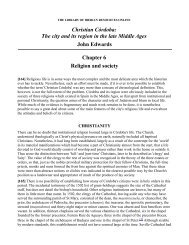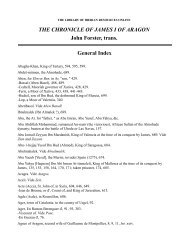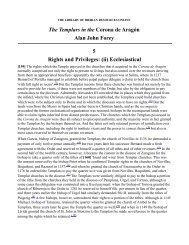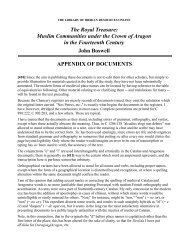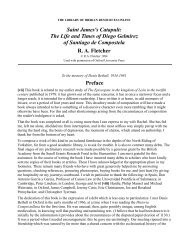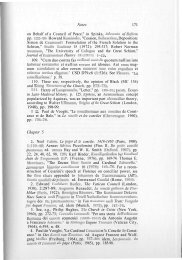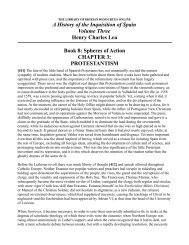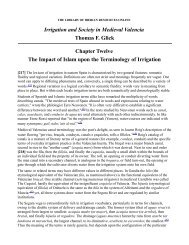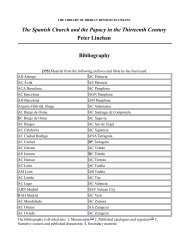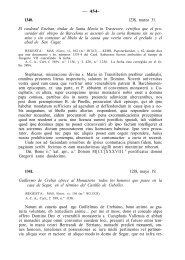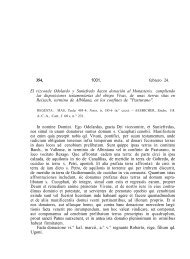Chapter 4 - The Library of Iberian Resources Online
Chapter 4 - The Library of Iberian Resources Online
Chapter 4 - The Library of Iberian Resources Online
You also want an ePaper? Increase the reach of your titles
YUMPU automatically turns print PDFs into web optimized ePapers that Google loves.
about him for which no certain answers are available. He was, like so many, de genere militari, (24) but<br />
all that can be said <strong>of</strong> his pre-episcopal period is that he was commissioned on at least three occasions<br />
to interest himself in the affairs <strong>of</strong> Aragonese religious communities: to defend the Dominican nuns <strong>of</strong><br />
Zaragoza; to restrain a clique <strong>of</strong> Augustinian monks <strong>of</strong> Santa María de Mur, Urgel, from joining the<br />
Premonstratensian Order; and to visit Ripoll. (25) Until October 1236 he remains a shadowy figure.<br />
In that month, however, his many virtues caught the attention <strong>of</strong> the canons <strong>of</strong> his own church <strong>of</strong><br />
Lérida, and they elected him as the successor <strong>of</strong> Bishop Berenguer de Eril. (26) Pedro was bishop <strong>of</strong><br />
Lérida for only fourteen months. Yet even in that short period he found time to issue an ordinatio which<br />
superseded the original ordinatio <strong>of</strong> 1168, (27) displayed his distinctive blend <strong>of</strong> idealism and realism,<br />
and demonstrated his understanding <strong>of</strong> the practical obstacles which stood in the way <strong>of</strong> moral<br />
regeneration. John <strong>of</strong> Abbeville had had precious little sense <strong>of</strong> reality and had acquired none while<br />
traipsing round Spain, but Pedro, though no less convinced than the legate that regimen animarum was<br />
ars artium, realised also that it had to be the art <strong>of</strong> the possible. And so he concentrated upon the<br />
logistics <strong>of</strong> the [59] problem, upon the economics <strong>of</strong> reform. <strong>The</strong> archdeacons <strong>of</strong> Lérida could not<br />
afford to carry out their visitations, 'propter quod grave sequitur dispendium animarum et multa<br />
insolencia in subditis enutritur et dissolucio cumulatur': he therefore increased their income. (28) Having<br />
himself no pied-à-terre within range <strong>of</strong> the city <strong>of</strong> Lérida, 'ad quam valeat declinare', he purchased the<br />
castle <strong>of</strong> Boyera from the communis mensa; (29) and to ensure a better attendance at cathedral services<br />
he created nineteen dimidiae porciones, one <strong>of</strong> which was earmarked for the support <strong>of</strong> a magister<br />
scolarum who was given the task <strong>of</strong> irrigating the intellectual desert thereabouts. (30)<br />
Pedro's Ordinatio Ecclesie Ilerdensis was issued on 11 December 1237. By then he was a prominent<br />
figure in the Aragonese Church which, since the death <strong>of</strong> Archbishop Sparago on 3 March 1233, (31) had<br />
been leaderless. It was to him, together with Bishop Bernardo Calvó <strong>of</strong> Vich and Raymond <strong>of</strong> Peñafort,<br />
that Gregory IX referred cases <strong>of</strong> high ecclesiastical politics during 1237: the revocation <strong>of</strong> certain<br />
actions <strong>of</strong> the late King Pedro II which had been prejudicial to the rights <strong>of</strong> the Roman Church; the<br />
request <strong>of</strong> Ponce <strong>of</strong> Tortosa for permission to resign his see; (32) and appointment to the bishoprics <strong>of</strong><br />
Majorca and Huesca. (33) Thus, in association with the holiest prelate <strong>of</strong> the province and the canonistsaint,<br />
he had a hand in the religious regeneration <strong>of</strong> the Aragonese Church even before his elevation to<br />
the archbishopric <strong>of</strong> Tarragona, which occurred in February 1238 after the chapter had resigned its<br />
rights <strong>of</strong> election to Gregory and the pope -- almost certainly on the recommendation <strong>of</strong> St Raymond<br />
[60] who had declined the position himself four years before (34) -- designated Pedro, the bishop <strong>of</strong><br />
Lérida <strong>of</strong> whom he had heard such excellent reports. (35)<br />
At the time <strong>of</strong> Pedro's promotion the Christian forces were massing for the final assault on the city <strong>of</strong><br />
Valencia, and its capture that autumn provided the new archbishop with an opportunity <strong>of</strong> taking stock<br />
<strong>of</strong> those <strong>of</strong> his suffragans who were gathered there, in the royal entourage, in expectation <strong>of</strong> grants <strong>of</strong><br />
territory. For five years they had had no archbishop to give them a lead, and Pedro could ill afford to<br />
lose time in asserting his authority. At 'a council' (as the witness, Ferrán Pérez de Torolio, remembered<br />
it), attended by his bishops and, significantly, by a number <strong>of</strong> friars, he stole a march on the archbishop<br />
<strong>of</strong> Toledo and appointed Berenguer de Castelbisbal as bishop <strong>of</strong> Valencia. (36) 'A council' held in those<br />
conditions, however, amidst the hurly-burly <strong>of</strong> military manceuvres, (37) was necessarily an ad hoc<br />
affair having little or nothing in common with the formal, full-dress assemblies <strong>of</strong> later years. Still,<br />
Pedro soon buckled down to his pastoral responsibilities. In 1239, during which year he was once<br />
described as a legate, (38) a start was made.



